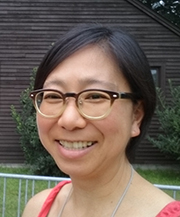Tomoko Komada, San Francisco State University
Moss Landing Marine Labs Seminar Series - November 21st, 2019
Hosted by the Chemical Oceanography Lab
MLML Seminar Room, 4pm
Open to the public

Abstract:
Organic matter decomposition at the seafloor constitutes a critical fork in the road in the global carbon cycle, where carbon is either returned to seawater and the atmosphere through decomposition, or sequestered over geological time. However, mechanisms of organic matter degradation, and factors that control its rate remain unclear. This presentation will highlight main findings from an ongoing project that aims to fill this knowledge gap by examining the composition and dynamics of dissolved organic matter (DOM) in the interstitial pore waters of marine sediments. Pore-water DOM plays a central role in the carbon recycling process, because sedimentary organic matter must be first solubilized to DOM before it can be utilized by the microbial community. Findings to date underscore the high molecular diversity of pore-water DOM, and indicate that degradation itself enhances this diversity. Degradation rate differs sharply across DOM constituents, and this variation in part correlates with the age of the substrate. Implications of these findings on the marine carbon cycle will be discussed.

